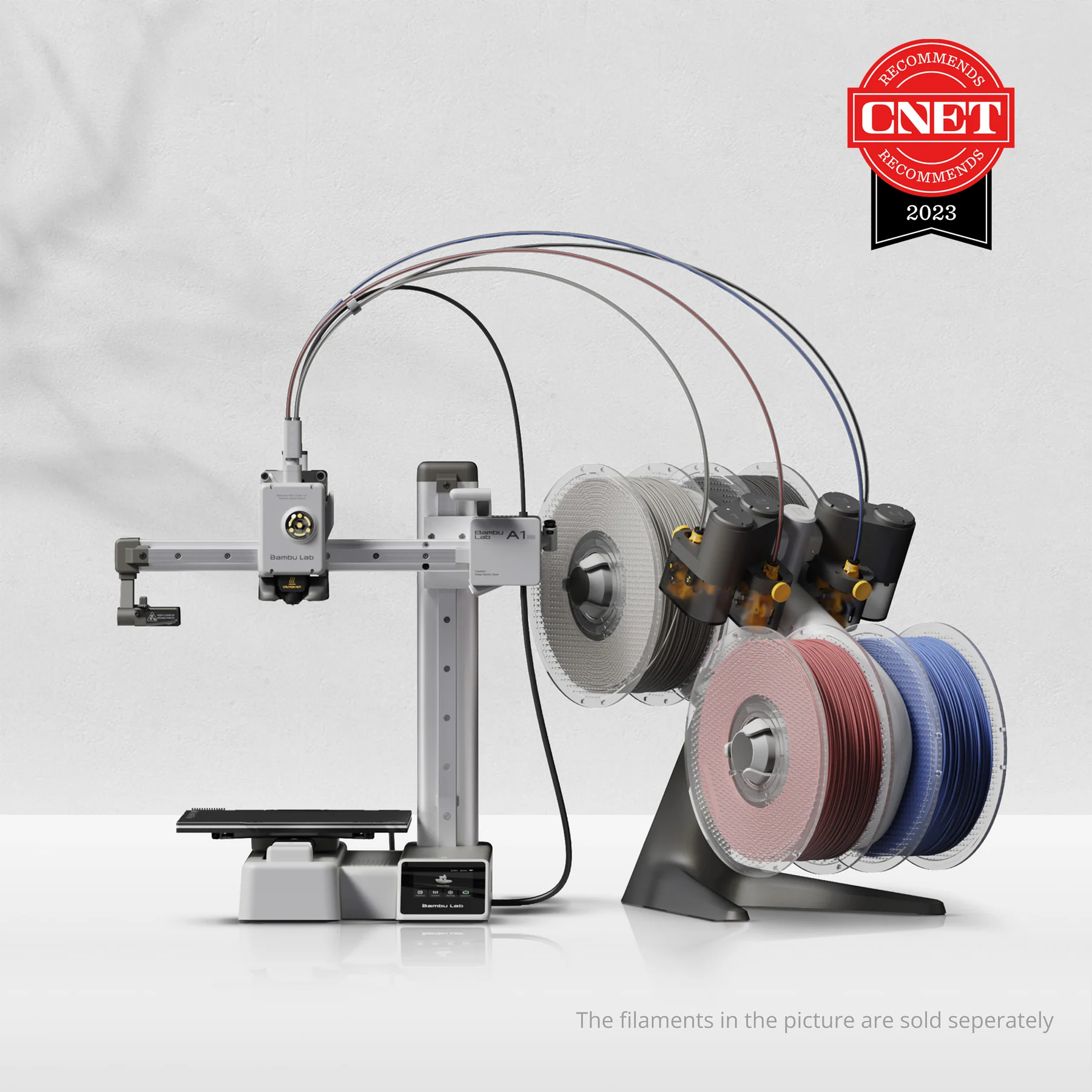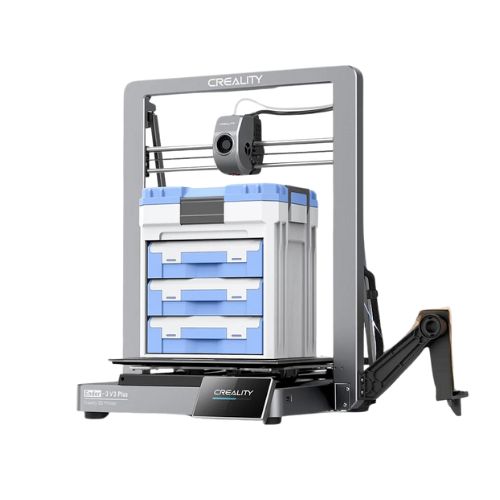Compare A1 Mini vs Ender 3 V3 Plus
Comparison between the best 3D printers
Choose the best 3D printer at the best price. The cheapest 3D printers are here.
Buy a 3D printer here with 3D Fila.
 |
 |
|
| Model | A1 Mini |
Ender 3 V3 Plus |
| Printing Material | Filament | Filament |
| Buy Filament for Bambu Lab A1 Mini | Buy Filament forCreality Ender 3 V3 Plus | |
| Estimated price | $549,00 | $479,00 |
| Manufacturer | Bambu Lab | Creality |
| Release Year | 2023 | 2024 |
| Print Volume [mm] | 180x180x180 | 300x300x330 |
| Printer Size [mm] | 315x347x365 | 410x445x577 |
| Weight [kg] | 5,5 | 11,5 |
| Power Loss Recovery | YES | YES |
| Enclosed printer | NO | NO |
| Bed Leveling | Automatic | Automatic |
| Filament End Sensor | YES | YES |
| Bed type | Heated | Heated |
| Power supply system | Direct Drive | Direct Drive |
| Standard nozzle | 0,4 | 0,4 |
| Maximum Nozzle Temperature [°C] | 300 | 300 |
| Maximum Bed Temperature [°C] | 80 | 100 |
| Maximum printing speed [mm/s] | 500 | 600 |
| Filament holder | YES | YES |
| Camera for supervision | YES | YES |
| Recommended filaments | PLA, PETG, TPU, PVA | PLA, TPU(95A), PETG, ABS, PLA-CF, PETG-CF, CR-carbon |
| Recommended slicers | Bambu Studio, Super Slicer, Cura, Prusa Slicer, Orca | Bambu Studio, Super Slicer, Cura, Prusa Slicer, Orca Slicer, Creality Print |
| Maximum Resolution [mm] | 0,1 | 0,1 |
| Processor | 32-bit Silenciosa | |
| Display | Touchscreen 2,4'' | Touchscreen 4,3'' |
| Power Supply | 150 W | 350 W |
| Connectivity | Wifi, Bambu bus, Cartão SD | Wifi, Bambu bus, Cartão SD |
| Operating systems | Windows, Linux, Macbook | Windows, Linux, Macbook |
| Date of registration in the system | 2024-04-10 | 2024-05-10 |
| Release date | 2023 | 2024 |
| Extra features | The Bambu Lab A1 Mini stands out not only for its impressive speed and automatic calibration, but also for its multi-color printing capability thanks to AMS Lite. This innovative system makes multi-color printing easy, making it accessible to everyone. AMS Lite, specific to the A1 Mini, supports up to four different materials simultaneously, providing creative freedom without complications. With comprehensive sensors for energy monitoring and recovery, a camera for timelapses and Wi-Fi control, the A1 Mini and AMS Lite together offer an intuitive and advanced 3D printing experience, ideal for materials such as PLA, PETG and TPU, and designed for simplicity and fast maintenance with quick-change nozzles. | The Ender 3 V3 Plus incorporates significant advancements in 3D printing, featuring a build volume of 300300330mm. It features a Creality operating system based on Klipper, which supports advanced functions such as linear advance and input shaping, and allows precise adjustments through root access or expert mode. The CoreXZ motion system allows a printing speed of up to 600mm/s, with an acceleration of up to 20000mm/s². Equipped with a flexible build plate and a quick-change nozzle with a hardened steel tip, the printer offers simplified maintenance and increased durability. Additionally, the high-speed direct drive technology of the extruder, together with an automatic leveling system and filament end sensors, raise the standard for reliability and efficiency. Compatible with a variety of filaments, including PLA and PETG, the Ender 3 V3 Plus is a robust choice for 3D printing enthusiasts and professionals. |
| Support for multiple colors and materials (AMS and CFS) | YES | NO |
Notes * |
||
| Cost-benefit | 7 / 10 | 7 / 10 |
| Hardware | 4.2 / 10 | 3.2 / 10 |
| Tela | . | . |
| Print volume | 3 / 10 | 4 / 10 |
| Performance | 4 / 10 | 5 / 10 |
Conclusion |
| In comparing the Bambu Lab A1 Mini and the Creality Ender 3 V3 Plus, both printers exhibit a range of strengths, making them appealing options for different users in the 3D printing community. The A1 Mini is notable for its speed, ease of use, and innovative features such as AMS Lite, which allows for multi-color printing with multiple materials. Its compact size and lower weight make it suitable for users with limited space, and its user-friendly interface, coupled with comprehensive monitoring capabilities, enhances the overall printing experience. Additionally, the A1 Mini’s performance is commendable, particularly for those focused on creative versatility without extensive setup. Conversely, the Ender 3 V3 Plus offers a significantly larger build volume, catering to users who require capability for larger prints. Its advanced operating system provides enhanced precision and customization for experienced users, and it is well-suited for robust materials like ABS and carbon-reinforced filaments. While it may entail a steeper learning curve for beginners, the Ender 3 V3 Plus is a powerful choice for enthusiasts seeking to push the boundaries of 3D printing. Considering price, both options present a good investment, though the Ender 3 V3 Plus offers a slightly better cost-benefit ratio alongside its superior volume and performance metrics. Ultimately, the best choice depends on individual printing needs: go for the A1 Mini for ease and innovation in creative projects, or opt for the Ender 3 V3 Plus for larger projects and advanced functionalities. Each holds unique advantages, ensuring that users, whether novices or professionals, will find value and satisfaction based on their specific requirements. |

